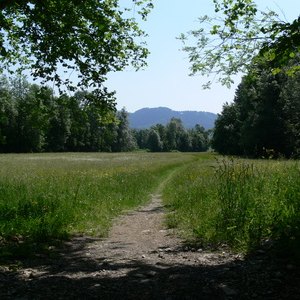
A right-of-way is a specific type of real estate easement, a land interest that allows one party to use another's land for a clearly defined purpose. There are several ways to create a right-of-way, and even more ways to terminate one. Real estate laws dealing with rights-of-way and easements may vary by jurisdiction; if you have specific right-of-way questions, you should ask an attorney.
Easements
An easement is an interest in a certain piece of land. This land is known as the "servient tenement." The easement allows another party, not the owner of the servient tenement, to make a very specific use of the servient tenement. However, granting of an easement does not allow the easement holder to use the land any way he wishes. Typically, at the time the easement is created, the boundaries of that easement are clearly defined, and any use beyond that can be considered a nuisance or trespassing.
Right-of-Way
A right-of-way is a type of easement that specifically allows the easement holder to pass over, under or through the servient tenement. A right-of-way is typically an easement appurtenant, meaning that the right is granted not to a specific person, but to another piece of land (the "dominant tenement"). Then, whenever the dominant tenement is transferred to the new owner, the right to use the servient tenement remains attached to the dominant tenement for use by the new owner. However, if the servient tenement is transferred to a new owner who has no way of knowing about the easement, this may release the new owner from the easement.
Express Right
Parties may create a right-of-way expressly, meaning through a straightforward written and signed agreement, executed in a manner similar to that of a real estate deed. However, some easements that will only operate for a very limited time may not require a written contract and signature. Typically, if a right-of-way agreement does not stipulate a time limit, courts will assume that the easement was meant to continue indefinitely.
Implication and Prescription
The law may also create a right-of-way by implication, with no agreement between tenement owners . This typically happens when the sale of one piece of land means that another piece of land loses access to public roads (becomes landlocked). At this point, the law will often find an easement by necessity and grant the dominant tenement right-of-way to access the road. One piece of land can also acquire a right of way via easement by prescription. This occurs when owners of one piece of land have made use of a right-of-way for so long and in such an open manner that the law will find that the first piece has acquired a "right" to the right-of-way.
Termination
Rights-of-way can be legally terminated in numerous ways, among them: the dominant and servient tenements legally merge; the dominant owner executes a legal release of the easement; the dominant tenement becomes "un-landlocked" (in cases of easement by necessity); the servient estate is condemned or the dominant owner simply shows an intent to physically abandon the easement.
References
- “Property (6th Edition)”; Krier, James E. and Michael H. Schill and Gregory S. Alexander and Jesse Dukeminier; 2006
- Law Library - American Law and Legal Information: Easement
- Nolo: right of way
- City of Colonial Heights Department of Public Works. "Easements - What Is an Easement?," Page 2. Accessed March 11, 2020.
- Henderson County North Carolina. "Subdivision: Right-of-Way Frequently Asked Questions." Accessed March 11, 2020.
- Majr Resources. "What Is the Difference Between Easement & Right of Way?" Accessed March 11, 2020.
- Utah Department of Commerce. "Easements." Select "Is an Easement a Property Right?" Accessed March 11, 2020.
- Expert Law. "What Is an Easement - Easement Rights and Duties." Accessed March 11, 2020.
- Trulia. "Easements: Know Your Property Rights." Accessed March 11, 2020.
- New York State Attorney General. "FAQs About Real Estate." Accessed March 11, 2020.
- Florida's Title Insurance Company. "How To Read a Title Commitment." Accessed March 11, 2020.
- Brewer Offord & Pedersen LLP. "What Is This “Easement” Thing In My Preliminary Report?" Accessed March 11, 2020.
- California Department of Insurance. "Title Insurance - Introduction." Accessed March 11, 2020.
Writer Bio
Erika Johansen is a lifelong writer with a Master of Fine Arts from the Iowa Writers' Workshop and editorial experience in scholastic publication. She has written articles for various websites.

